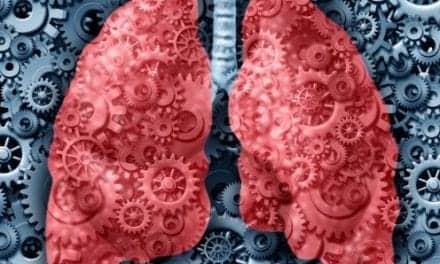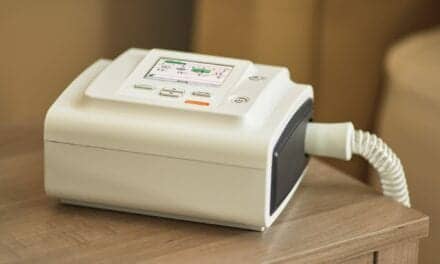 |
Prior to 1995, the genetic disorder known as alpha-1 antitrypsin deficiency (alpha-1 for short) was the underdog in a race for research dollars. Lumped under the COPD umbrella, the disease failed to gain the support of investigators necessary in the quest for better therapies—or even cures. Alpha-1 is characterized by a deficiency in the production of the protein alpha-1 antitrypsin, which protects lungs from enzymes of inflammatory cells, especially elastase. In its absence, elastase is free to break down elastin, which contributes to the elasticity of the lungs, resulting in respiratory complications such as emphysema or COPD.
The complexion of that race changed imperceptibly in 1989 when businessman John Walsh, who owned a technology firm at the time, was diagnosed with alpha-1. Walsh had shown symptoms for 5 years, but physicians thought he had only allergy-induced asthma. Left with only 37% lung function, Walsh learned all he could about the genetic condition, and eventually participated in a National Institutes of Health (NIH) study. Ultimately, the NIH decided that the study’s conclusion would mark the end of alpha-1 research.
The NIH rationalized that they had successfully identified the alpha-1 protein in plasma, which was subsequently commercialized into a drug—with the objective to slow down the progression of the disease. “The NIH said they were not going to do any more research,” says Walsh. “So we created the Alpha-1 Foundation (www.alphaone.org) to provide the leadership and resources to increase that research, improve health, promote worldwide detection, and cure alpha-1.”
The Race Begins
In short, alpha-1 was now a contender. Walsh and two other “alphas” from Miami in 1995 founded the organization, and 3 years later—when they had developed the organization’s infrastructure—funding began. Working with collaborators in the scientific community, Walsh and his colleagues created a research registry of individuals who had alpha-1. If researchers needed patients who could participate in clinical trials, a database stood at the ready. After that, they coordinated an investigative group made up of clinicians who understood alpha-1. That initial group has expanded to include more than 60 clinical resource centers across the country.
Expanding the network of clinicians who “understood” was not an easy task, as Bob Campbell, communications manager for the Alpha-1 Foundation, can attest. As an alpha-1 and COPD patient himself, the 64-year-old Campbell was not diagnosed until age 55. Even though Campbell had clearly defined COPD in his 20s (despite never smoking a cigarette), his physician “was not terribly curious” about the unusual situation.
In fact, none of the pulmonary specialists he encountered over many years expressed any particular surprise that a young nonsmoker could have COPD. Illumination only came after Campbell took the initiative to go to an allergist at the age of 55, a time when he was working full time in a difficult job that demanded a lot of energy. Thinking allergy shots might help what he thought was asthma, Campbell self-referred and eventually received knowledge that would change his life. “The allergist told me that he did not see any major allergens when he did all the testing,” says Campbell. “The allergist noticed the severe COPD and the lung damage, and he noticed my smoking history was nonexistent. He did the logical thing and gave me an additional test, because he just wanted to rule something out. And of course, it turned out that I had alpha-1.”
Why did not even one of the long line of pulmonary specialists ever once mention alpha-1? It is a good question, and Campbell believes it is not an uncommon story in today’s pulmonary world. “No one showed any signs of wanting to test me for anything in particular,” laments Campbell. “Many alpha-1 patients seem to get diagnosed almost accidentally, which is the way I would describe my own diagnosis. Had it not been for that one extra test, there is no reason to think that I would have been correctly diagnosed today.”
For Campbell, the chance diagnosis proved invaluable because there were some treatments for alpha-1. The bottom line, says Campbell, is that doctors are not testing the prime suspects for it, and respiratory therapists do not have it on their radar. “Anybody with COPD and no smoking history, or a family history of alpha-1, ought to be tested for alpha-1,” says Campbell without equivocation. “At that point, the question of genetics should be obvious. People who come down with COPD very early in life are a tiny minority of the COPD population. Even pack-a-day smokers rarely come down with COPD in their early 30s or 40s. It’s much more common to have someone diagnosed with COPD in his 60s or 70s after a long period of smoking.”
And alpha-1 patients who smoke tend to come down with COPD even earlier than those who do not smoke. Many of those patients are still not being tested for alpha-1, and smoking is, instead, being blamed 100%. In addition to helping patients, Campbell and Walsh hope to educate RTs and pulmonary physicians about alpha-1, how it develops, and how it can be treated.
The Blitz Is On
True to his word, Walsh’s Miami-based Alpha-1 Foundation has funded $35 million in research at nearly 70 institutions in North America and Europe. In addition to fund raising vigorously for research, the foundation has worked hard to form crucial partnerships with legislators in Washington. Not surprisingly, the primary advocacy objective has been lobbying for more research dollars.
Victories with coalition partners include the support of the NIH’s Office of Rare Disease Research, and the Rare Disease Clinical Research Network. “We also led a coalition and created the Airline Oxygen Council of America to specifically address the issue of access to oxygen on airlines,” says Walsh. “As a result, we had a big victory last year. And as of June 2009, any airline that takes off from or lands on United States soil must allow an individual, who has a prescription for supplemental oxygen, aboard the aircraft with a portable oxygen concentrator. And we worked through all the various agencies to get that ruling.”
Fighting aggressively alongside the American Association for Respiratory Care, the Alpha-1 Foundation successfully advocated to include reimbursement for pulmonary rehabilitation in last year’s Medicare bill, which goes into effect June 2010. Like many other organizations, the Alpha-1 Foundation has focused its advocacy initiatives on the Centers for Medicare and Medicaid Services (CMS) to address crucial access issues. For example, both Campbell and Walsh are on augmentation therapy to stabilize their lung function. Intravenous infusions of the drug Prolastin, wherein the alpha-1 protein is replaced, usually take place at home.
Close relationships with the NIH and Food and Drug Administration have fostered effective clinical trial designs and biomarkers for clinical endpoints. “We had a victory this year when the FDA accepted high-resolution CT as an endpoint for clinical trials,” says Walsh. “We had workshops in 2005 and 2009 on the topic of imaging, and we cosponsored a workshop with the FDA. And it was brought up before the blood products advisory committee. This was critical, because it really allowed for precise measure of the effectiveness of a drug, so we put a significant amount of effort into that.”
Friends in High Places
Walsh counts Sen Mike Crapo (R-Idaho) as a staunch ally, while Mike Crapo’s brother James Crapo, MD, is on the COPD Foundation’s board. Senator Crapo is also cochair of the congressional COPD caucus, with Sen Blanche Lincoln (D-Ark) and Rep Cliff Stearns (R-Fla).
With the help of 15 full-time employees, Walsh nurtures these relationships across the country through countless communications with clinicians, RTs, and lawmakers. It is a lot of work, but before taking over the foundation full time, Walsh thought he could also run his technology firm. “I tried to do both, but I crashed with a heart attack and had open heart surgery [shortly] after we started the foundation,” he confesses. “I had bypass surgery in 1996 just about a year and 4 months after we started.”
When you go over the sheer volume of concrete initiatives at the Alpha-1 Foundation, it is almost impossible to imagine any other role for Walsh. In addition to raising and distributing a lot of money, Walsh helped to form a therapeutic development network with four centers identified to do clinical trials “We raised money to build the international genetic reference lab at the University of Florida College of Medicine, where we also house our DNA and tissue bank,” says Walsh. “And we also established our translational research laboratory, which has been the central laboratory for all of our clinical research. These resources are available to the international investigator community.”
The same three alpha-1 patients who created the Alpha-1 Foundation also created AlphaNet just a few months after creating the foundation in 1995. AlphaNet is a health management company and also a 501 (c)(3) not-for-profit organization. Walsh created it to foster a comprehensive health management system for people with Alpha-1. “The therapy was just being delivered by home infusion companies, and the home infusion companies were making a fortune off of us and not really contributing to help support the community,” says Walsh. “We created AlphaNet to essentially distribute the only drug that was available. And we contracted with nursing agencies just like the home infusion companies did. We came in at $.19 a milligram, when the usual price range was about $.51 to $.82 a milligram.
“We created a recurring source of revenue to support research,” continues Walsh. “We referred to it as the ultimate in recycling of our insurance dollars. We also developed a comprehensive health management system at www.alphanet.org. Basically, it is a ‘Bible’ to show you how to take care of yourself if you have alpha-1. We have more than 3,000 people regularly using AlphaNet—which is part of the foundation’s goal of improving health.”
Walsh and Campbell ultimately work within the COPD framework since COPD covers many conditions, primarily emphysema, bronchitis, and other chronic and/or obstructive lung diseases. According to the NIH, there are 12 million people in the United States diagnosed with COPD. “Alpha-1 is a small subset of that population,” explains Campbell. “Experts estimate that there are about 100,000 people with alpha-1 in the United States. Fewer than 10% have been diagnosed. The other 90% of alphas have not been diagnosed despite spreading awareness, so we are nowhere near satisfied.”
Campbell says that alpha-1 will always be a minority factor within COPD. About 3% of all people diagnosed with COPD may have the disease. Still, the number is significant enough that advocates agree that testing should be far more prevalent than it is. “The World Health Organization, the American Thoracic Society, and the European Respiratory Society all believe that many more people with COPD should be tested for alpha-1, and only a tiny number of those COPD patients are now being tested.”
Thanks largely to the Alpha-1 Foundation, a lot of basic research on alpha-1—$35 million worth—has already been completed. Campbell, Walsh, and Alpha-1 Foundation partners are now pushing for more. They have already come a long way, and no one should underestimate them. “We are now interested in promoting more directed research,” says Campbell. “We are working toward adding that to our research portfolio. We are looking for more drugs and therapeutic approaches, and obviously a cure is what we are after.”
Greg Thompson is a contributing writer for RT. For further information, contact [email protected].










